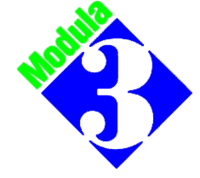Modula-3: Difference between revisions
No edit summary |
|||
| Line 1: | Line 1: | ||
[[Image:M3.png|200px|right]] | [[Image:M3.png|200px|right]] | ||
One of the few languages out there designed as a systems language from the outset. Originally developed by [[Acorn]] USA an operating system development tool and then called Modula-2+, it added multitasking, threading and multi programming features to the [[Modula-2]] programming language, but M2 itself is a development of [[Pascal]] by its original author and adds separately compiled modules, stricter & clearer syntax and a host of system programming additions to Pascal in addition to a general clean up of the language features. Modula 3 is a development that adds memory management (garbage collection), type & generic safety features, generic programming, better exception handling and object-oriented extensions to Modula-2+. | One of the few languages out there designed as a systems language from the outset. Originally developed by [[Acorn]] USA an operating system development tool and then called Modula-2+, it added multitasking, threading and multi programming features to the [[Modula-2]] programming language, but M2 itself is a development of [[Pascal]] by its original author and adds separately compiled modules, stricter & clearer syntax and a host of system programming additions to Pascal in addition to a general clean up of the language features. Modula 3 is a development that adds memory management (garbage collection), type & generic safety features, generic programming, better exception handling and object-oriented extensions to Modula-2+. There is also an obscure variant called simply '''Modula-3*''' that adds strong parallel processing features to the language. | ||
;Obliq | ;Obliq | ||
| Line 33: | Line 33: | ||
* Luca Cardelli and Rowan Davis: [http://lucacardelli.name/Papers/ServiceCombinators.US.pdf Service Combinators for Web Computing] - In PDF format - 1997/9 - Obliq related. | * Luca Cardelli and Rowan Davis: [http://lucacardelli.name/Papers/ServiceCombinators.US.pdf Service Combinators for Web Computing] - In PDF format - 1997/9 - Obliq related. | ||
==== | ;Modula-3* | ||
* | * Ernst A. Heinz: [http://citeseerx.ist.psu.edu/viewdoc/download;jsessionid=381BE5E5C881A2E8084981EB54C3B025?doi=10.1.1.55.1978&rep=rep1&type=pdf MODULA-3*: An Efficiently compilable extension of Modula-3 for problem-oriented explicitly parallel programming] | ||
==Links== | ==Links== | ||
Revision as of 12:24, 12 March 2016

One of the few languages out there designed as a systems language from the outset. Originally developed by Acorn USA an operating system development tool and then called Modula-2+, it added multitasking, threading and multi programming features to the Modula-2 programming language, but M2 itself is a development of Pascal by its original author and adds separately compiled modules, stricter & clearer syntax and a host of system programming additions to Pascal in addition to a general clean up of the language features. Modula 3 is a development that adds memory management (garbage collection), type & generic safety features, generic programming, better exception handling and object-oriented extensions to Modula-2+. There is also an obscure variant called simply Modula-3* that adds strong parallel processing features to the language.
- Obliq
Obliq is an interpreted domain specific programming language that is shipped with later versions of the Modula-3 System. It is intended to be used to program web "agents" (in a much wider understanding than agents are used in normal computer speak), in other words a utility programming language for the web rather than a scripting language of any sort and is in this reminiscent of WebL (Oberon variant).
A list of OS/2 implementations of Modula-3
- SRC Modula 3 - Open source - Discontinued
- Modula 3 Reboot - Open source - Current?
OS/2 text editors with Modula 3 support
- jEdit - Java based editor - Modula 3 syntax highlighting built in - Current.
A list of DOS implementations of Modula-3
- SRC Modula 3 - Open source - Discontinued
- M3PC-Klagenfurt - Open source - Discontinued
Publications
- G. Nelson (ed.): System Programming with Modula-3 - 1990 - Prentice Hall - ISBN 0-13-590464-1
- Joseph Bergin: Object-Oriented Data Abstraction in Modula-3 - 1997
- Michel R. Dagenais: Building Distributed OO Applications: Modula-3 Objects at Work - Draft Version - 1997
- Luca Cardelli, Jim Donahue, Mick Jordan, Bill Kalsow and Greg Nelson: The Modula-3 Type System - In PDF format
- Luca Cardelli: Typeful Programming - In PDF format
- Luca Cardelli, James Donahue, Lucielle Glassman, Mick Jordan, Bill Kalsow and Greg Nelson: The Modula-3 Report (Revised) - In PDF format - 1989
- Obliq
- Luca Cardelli: Obliq - A language with distributed scope - In PDF format - 1994.
- Luca Cardelli: A Language with Distributed Scope - In PDF format - 1995.
- Luca Cardelli and Krishna A. Bharat: Distributed Applications in a Hypermedia Setting - In PDF format - 1995.
- Luca Cardelli: Global Computation - In PDF format - 1996.
- Luca Cardelli: Mobile Computation (Position Paper) - In PDF format - 1995 - Obliq related.
- Luca Cardelli and Krishna A. Bharat: Migratory Applications - In PDF format - 1997
- Luca Cardelli and Rowan Davis: Service Combinators for Web Computing - In PDF format - 1997/9 - Obliq related.
- Modula-3*
- Ernst A. Heinz: MODULA-3*: An Efficiently compilable extension of Modula-3 for problem-oriented explicitly parallel programming
Links
- Modula-3 Org - Info and links on the Modula 3 language.
USENET
- comp.lang.modula3 - Very low volume - Go to the Google groups version if you or your ISP are newsgroup challenged in some way.
Standards
- The revised version of the original Modula-3 report and the associated paper below
- Some useful Modula-3 interfaces.